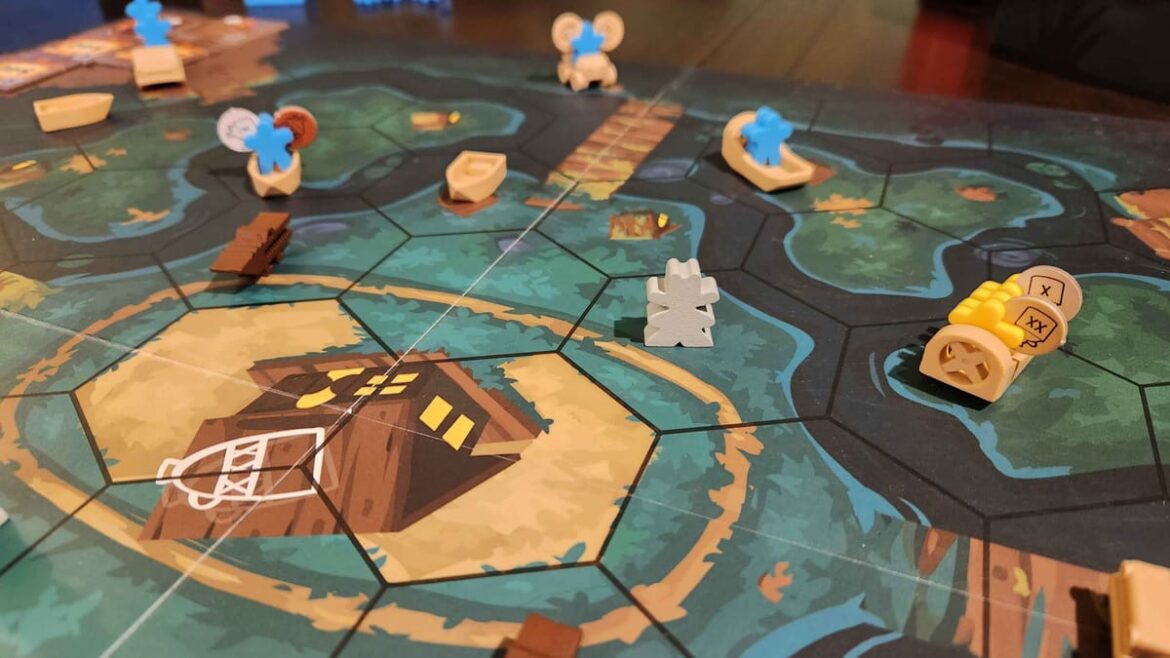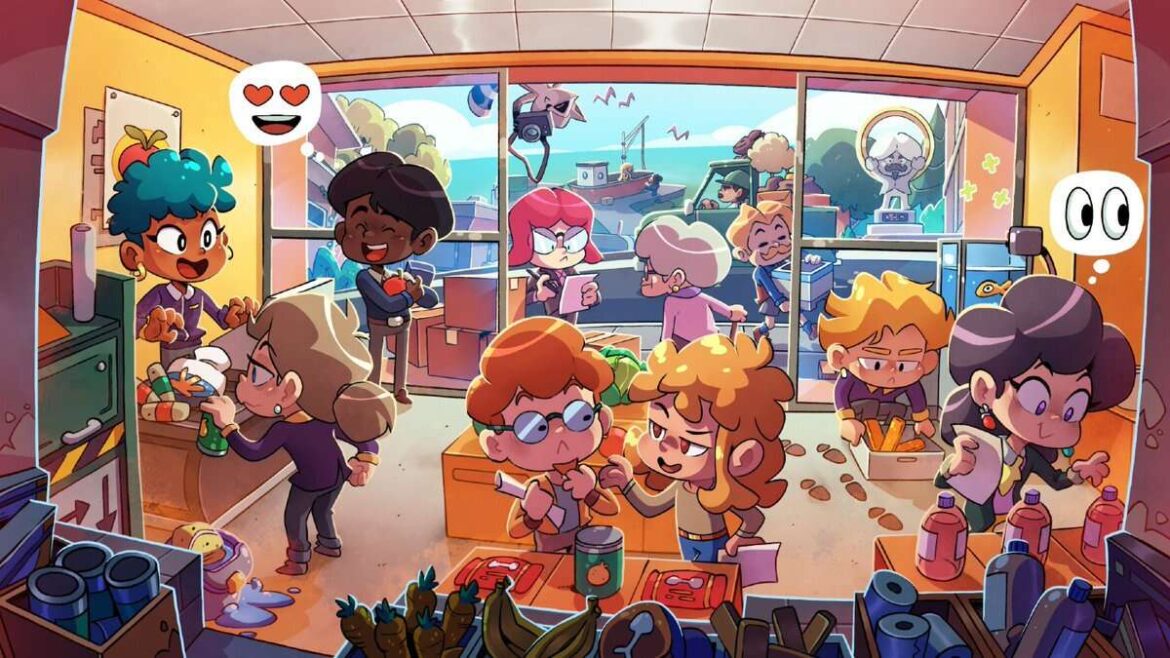Editor’s note. This review is based mostly on the version 1.0 rulebook provided with the review. There has been a release of rules 1.2, and I’ll reference some of the updates and improvements throughout the review. Those updates can be found here.
Moonshine Empire is a game about making and selling moonshine. It’s mostly pickup and deliver, with an auction to set up your camp, and a few ways to navigate the swamp to get to Pappy’s tavern where eager customers wait for you to deliver their orders. Do well enough and you get to take over the tavern when Pappy retires. The theming and art are doing a lot of heavy lifting here, as the gameplay suffers from problems in all directions.
Before you can make any moonshine, you need to outfit your camp. Every character starts with a slightly varied camp with different starting vehicles, things to do at camp (running stills or moonlighting for cash), and zero, one, or two Shiners (workers). Every round, you’ll get an extra Shiner to join your camp as your cousins hear that you need help. After that, there will be a two-round auction to outfit your camp, upgrade your movement, or grab extra points.
The wheels (or oars) start to fall off pretty much immediately. Some characters start with enough workers to run every piece of their camp, others only get their first Shiner at the beginning of round one and therefore are limited to only one action. I don’t mind asymmetry, but if a character starts with stronger actions but can only do one that is fundamentally weaker than two or three slightly weaker actions. But wait, you say, the auction is a great leveler, and you can offset a weaker start with great things at the auction. Too bad the auction happens after the first round’s worth of action at camp. And since nobody starts with money, a character with only one Shiner has to decide if the money is worth losing one of only eight rounds of possible distillation (you know, the core of the game).
A character card with a few upgrades, customers to deliver to, and completed customer cards.
Before the auction happens each round, you can pick customers to try to deliver to. You don’t have to deliver their order that round. But if you can’t deliver any orders for long enough, you’ll cap out your orders and lose out on future customers until you can make a delivery. And since you don’t know what’s going to be up for auction, you might not be able to plan for the best order to take. There’s some variance in the rewards for customer orders that adds spice: cash, points, vehicles, the top card of the auction deck, or a combination.
Then there’s the auction. There are two rounds to each auction, and everyone is guaranteed to get a card in the first round—even if they bet $0. To combat this, Pappy will then include one less card per $0 bid in the offering in the second round. Here, this balancing mechanic doesn’t quite do what it’s supposed to. Instead of punishing the freeloader, the most likely party to not benefit from the second round will be the poor sap who paid Pappy last round and therefore is out some of their hard-earned money. That, shockingly, isn’t the part of the auction that bothers me, since you can flex your strategy to deal with the moochers. The benefits up for auction are of such widely varying value (and at different parts of the game, the value of a given card varies) that a bad offering in the first round of gameplay can kneecap a player. If you start with a single Shiner, an early card with extra Shiners can be a lifesaver. If your camp isn’t great, a triple still can turn it into a powerhouse. Upgrades are also much more useful early rather than late, but all of them are useful. With the updated rules, each unit type (Shiners and each vehicle) can only have one upgrade instead of stacking a really powerful unit. On the weaker side of the auction, moving around the turn order or getting the ability to sell moonshine for some cash isn’t useful on turn one, and a player who started behind might be stuck with one of those because they are simply too poor to outbid a competitor. A saving grace of the auction is that some cards give you two options to pick from. To an extent, I like that some cards vary in value throughout the game, but especially towards the end of the game, I’ve seen piles of vehicles in every camp.
A single shiner hangs out in camp with two rowboats, an ATV, an airboat, and a truck.
The rules update makes the movement phase much clearer and interesting enough to talk about. There’s more clarity around what the special spaces are – Pappy’s tavern and your camp area. The bridge to Pappy’s island isn’t actually a complete barrier to rowboats, which adds a lot of options for their use. Additionally, despite the art, the two hexes on Pappy’s island that look to be entirely land are specified as land and water. This small change means there are more spaces where a vehicle (mostly rowboats) can get a Shiner near enough to Pappy’s tavern that they can hop out and deliver moonshine without a round sitting in the path of police or gators. The extra routing options are extremely useful and helpful where the biggest rules clarification comes into play: Shiner movement. The movement of Shiners is now explicitly laid out and rearranging is now defined! Rearranging is the clearest winner of the rules update. Whereas before it wasn’t clear if rearranging to leave or enter vehicles cost the Shiner their movement, it is now defined to NOT cost movement. This means that if you have a chain of vehicles with good placement, you can get from camp to tavern in one round.
So let’s say you’ve gotten through a round or two. At this point, you’ve leveled up your camp, gotten a few more Shiners in your crew, and maybe even started your way towards Pappy’s tavern. There are swamp tiles that you might be thinking about looking at. Some lock you in place until you achieve them, others are optional but have a cost that gives you some small advantage. Each is going to require you to fulfill an objective to collect the tile and the points it represents. Some require you to lose items like the airboat that got you to the hex or some cash. They can be quite dangerous in the early game if you suddenly can’t leave a spot and need to send a Shiner to rescue the trapped cousin. But, in every game I played, swamp tiles were the deciding factor in who won, so you should pick them up when you can tolerate the risk. Here’s a part where the rules update did a lot of work. The extra definitions made it more clear when you have to bring pieces to the spot, e.g., Shiners helping someone paint their shack, versus losing pieces, e.g., sacrificing moonshine for a shiny new truck.
As we reach the end of the game, you have one last round (the eighth) to squeak out a few more points in deliveries, cash, and auction cards. We also reach the last gripe I have here. If, in the previous round, you didn’t leave vehicles in the swamp on the way to Pappy’s, you simply can’t deliver any moonshine that you make this round. The new movement clarifications make this a bad strategy decision instead of a likely occurrence due to optimization of the previous turns, which I really like. If you fall into that trap, you’ll have to hope that the deliveries that you sent in round seven will cover your round eight order or bank on the auction card that lets you sell moonshine without making it to the tavern.
Review Guidelines
Below Average
This game suffers from balance issues, unfun phases, and limited decision making. The updated rules make movement one of the most interesting and fun aspects of the game, instead of “move directly to the tavern at your fastest speed”.
Pros
- Updated rules are much clearer, which makes gameplay simpler.
- Movement becomes a minigame unto itself
- Theming
Cons
- Characters aren’t balanced
- Auction isn’t balanced
- Easy to ignore swamp tiles and setting up round eight properly
This review is based on a retail copy provided by the publisher.
Share this article
The link has been copied!
Affiliate Links


